Affiliate links on Android Authority may earn us a commission. Learn more.
Huge Samsung defeat – what caused Apple’s $1 billion win in U.S. patent case [full verdict]
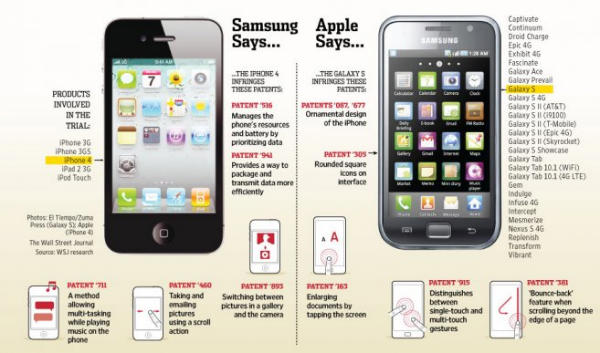
You probably know by now that Samsung has just gotten its ass kicked by Apple in court in San Jose, California, in one of the most important patent legal conflicts of our times, and in one of the most important patent fights between the two, with Apple in a war that spans across four continents, with more than 50 cases filed in 10 countries so far.
The unexpectedly fast verdict was filed on late-Friday, and it heavily contradicts the findings of a South Korean court in a similar case. That court said that both sides infringe on the other’s patents and awarded damages in the thousands for each party.
But the jury in this first U.S. trial awarded a complete and unquestionable win to Apple. Samsung lost on all counts, except in the tablet patent battle, but that victory doesn’t count that much and I’ll tell you later why.
We have thoroughly covered the U.S. Apple vs Samsung case for the better part of the month – from opening to closing statements – and we looked at all the evidence each side pitted against the other. I said more than once that the evidence presented in court does not look good for Samsung, and that the Android maker will have a very tough job proving that it didn’t infringe on the patents claims part of the trial.
And apparently the jury thought so too.
The Verdict
As you may already know, the jury had to look at all the evidence, examine all the devices, and fill in a 20-page lawyered form (a joint result of Apple’s and Samsung’s proposed jury forms) comprised of over 700 per-patent per-device questions grouped in 33 main questions dealing with patent infringement, trade dress, antitrust and damages. On top of that, the jury had to take into account an over 100-page jury instruction form provided by the court to help with issuing a verdict.
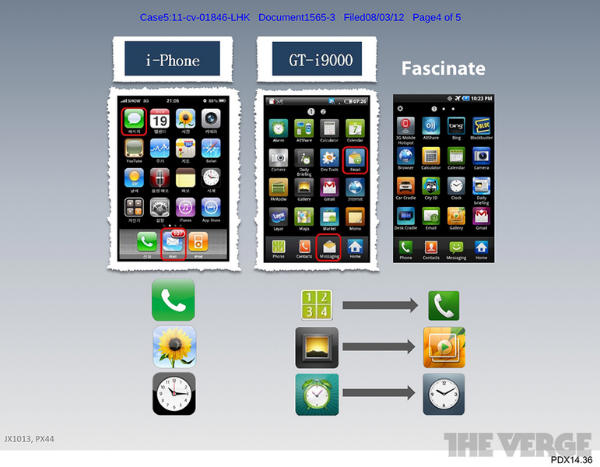
So how did Samsung manage to obtain such an adverse verdict? Simply put, its lawyers were not able to demonstrate that the Samsung products Apple alleged were infringing on various patents were, in fact, not infringing those patents. Samsung was not able to invalidate any of Apple’s patents. Samsung was not able to prove that its design choices were largely related to device functionality, therefore its devices were not infringing. Samsung was not able to prove it did not copy the iPhone, although it was successful in proving it didn’t copy the iPad. Samsung was not able to prove that any patent infringements, if found, were not willful.
Moreover, Samsung was not able to demonstrate that Apple infringed on its own patents – in fact, the jury did not award any damages to Samsung for its own patent claims. There is some good news here for Samsung, that it did not violate antitrust laws with its FRAND patents used against Apple in the trial, which means it doesn’t have to pay anything to the iPhone maker on top of the $1 billion in damages already awarded by the jury. At the end of this post you’ll find the full verdict form as submitted, and amended by the jury. But we’re going to talk about the juicy parts in what follows.
iPhone design – trade dress and software patents
Nearly every Samsung smartphone part of the trial – and specifically the Galaxy S and Galaxy S2 former flagship devices that helped the company become what it is today in the smartphone business – have been found to infringe on Apple’s software patents that describe such “minor” details as the “bounce-back” feature, multi-touch or “tap-to-zoom.”
In addition to software patents, who ultimately can be worked around if Samsung and/or Google so desire – and chances are the companies will have to do so in order to keep such functions available on handsets and tablets without infringing any patents – Samsung’s devices were also found to be infringing the patented iPhone design.
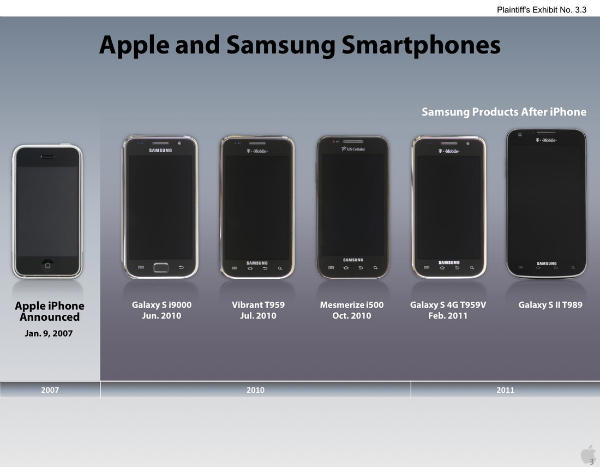
According to the jury, various Galaxy-branded devices diluted the iPhone’s trade dress, in general, and specifically the registered iPhone 3G trade dress. In plainer words, Samsung copied the iPhone with various design variations and now it will have to suffer the consequences, and we’re talking about damages and potential sales ban as Apple is going to go forward with its actions against the Android maker. Sure, appeals will follow, but that doesn’t mean Apple’s win can be simply erased, and a complete overturn of the verdict is largely unexpected. Reuters notes:
“The impact on Samsung will be quite limited, as affected models are mostly legacy products and its new products did make some design changes to avoid potential litigation,” said D.J. Jung, representative patent attorney for SU Intellectual Property.“Still … it’s a sweeping loss in the most important market. It’s inevitable that Samsung’s brand will be negatively affected – Samsung could be perceived as a copycat.”
iPad design
The good news for Samsung is that its Galaxy Tab 10.1 did not infringe the iPad design patent, therefore Samsung did not copy the iPad with its products. While the verdict is favorable to Samsung, it still doesn’t mean much for the tablet market, one that is not only undisputedly dominated by the iPad, but also one that is getting harder and harder for Samsung to compete in as important players such as Google and Amazon (with Apple joining soon) releasing affordable 7-inch devices that cannibalize “regular” Android sales.
Moreover, the Galaxy Tab 10.1 was also found to be infringing on software patents, so the device is not exactly safe against further Apple action. The iPhone maker is certain to appeal on this ruling, as the iPad is one of its major products and it would definitely love to score a victory in this department against Android as well.
Willfulness
The jury found that Samsung has willfully infringed on Apple’s patents, which is another major defeat for Samsung. On those grounds alone, Judge Lucy Koh could triple the damages amount due to Apple. Of course, we’re yet to see such developments yet, as the jury has just filed in the verdict, which means both companies are now devising post-trial strategies, including future appeals and motions.
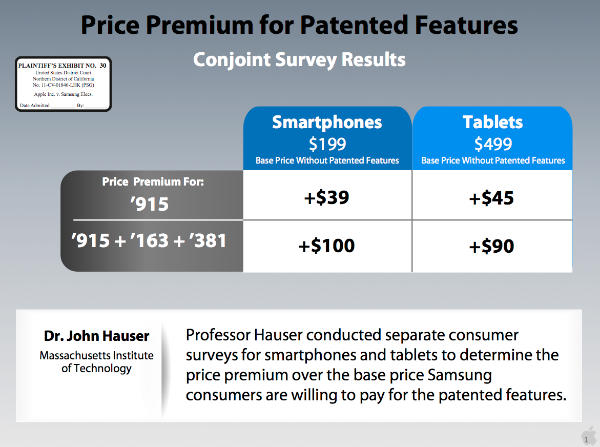
Samsung patents
What’s disturbing for Samsung is that it was awarded $0 in damages. In other words, Apple proved that its iOS product do not infringe on Samsung patents, patents that were deemed valid by the jury. Therefore ,Samsung does not have a bargaining chip that could have been used in future settlement talks – let’s remember that there are plenty of outstanding Apple vs Samsung conflicts in the world, with one other U.S. trial between set to start soon.
What’s next?
Various pundits, tech publications and legal entities are speculating on what each party will do, and everyone agrees that appeals are in order, and further legal actions from both parties will follow.
Samsung
Samsung will most likely try to have Judge Koh overrule the findings of the jury, or at least lower the damages. The company will go forward with appeals either way, although its not clear from Samsung’s recent statements what the next steps are. Android Police notes:
Suffice to say, Samsung’s appeals docket will probably be pretty long. How much good will it do? Just know that the 9th Circuit Court of Appeals has a little over 10% rate of overturning district court decisions. Better than some circuits, but it doesn’t take a genius to see those aren’t good odds. Considering the parties haven’t settled by now (and Samsung won on zero counts), it’s unlikely Apple will be interested in compromising in exchange for Samsung foregoing an appeal. At this point, they’re in it to hurt Samsung, as they’ve made clear.
But CNET says that:
While the victory is important for Apple, it shouldn’t count its money just yet. The company still faces a federal circuit that reverses at least something in about half the cases it reviews. In addition, large patent verdicts have been frequently reversed or lowered. “It feels like its over but it’s got a long way to go yet,” notes Brian Love, law professor at Santa Clara University.
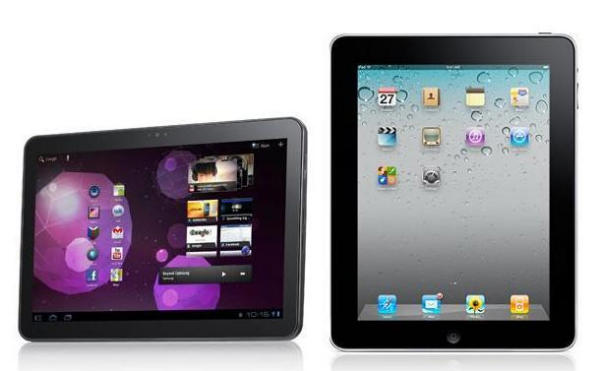
Apple
Apple asked for $2.5 billion initially, although admitted it prefers product bans rather than monetary compensation. The company could still try to convince Judge Koh to triple the damages, and it’s more than likely to try to obtain temporary and permanent injunctions against the Galaxy-branded devices found infringing on Apple patents that are still selling on American soil. We’ll find out more details about Apple’s own legal plans in the weeks and months to follow, as Apple has already filed paperwork to proceed with an injunction against Samsung products.
A September 20 hearing on the matter has been scheduled by Judge Koh.
Android
Finally, this is a huge defeat for Google. While the company is not involved directly in the Apple vs Samsung trial, it’s Android OS took a beating in court, and therefore the partial outcome of this legal fight – and we’re months or years away from a final result between the two sides – will definitely hurt Google and its partners interested in Android including OEMs and carriers.
How do you feel about the whole U.S. Apple vs Samsung trial result?